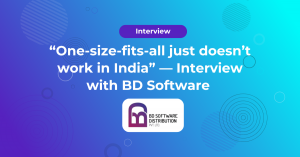We sat down with Maher Keskes, Business Development Manager for French-speaking Africa at Axidian, to talk about how digital access and identity security are evolving in North Africa and why this region is attracting attention from both regulators and vendors.
Maher has been working closely with teams across Morocco, Tunisia, Algeria, and beyond, helping organizations rethink how they manage user access, enforce multi-factor authentication, and align with new compliance mandates.
What’s a misconception that global companies often have about identity-related challenges in North Africa?
“A common mistake is assuming that what works in Europe or the U.S. will work the same way in North Africa. Copy-paste rarely works here — the region has its own regulatory frameworks, infrastructure, and deployment constraints.”
Maher Keskes
Why it matters:
The reality is that North Africa has uneven levels of digital maturity and faces a unique mix of compliance expectations and infrastructure limitations. Applying rigid, global templates often leads to failed deployments or low adoption. To succeed, companies need localized strategies — tailored not just technically, but socially and legally.
One of the key barriers is the regulatory gap: only around 72% (39 out of 54 countries) in Africa have adopted cybersecurity laws, according to data from Compliance Hub. This patchy legal landscape adds complexity and highlights the need for region-aware approaches to access control and identity management.
What identity blind spots are most commonly exploited in North African organizations and why do leaders often miss them?
“There’s still a reactive approach to access management and that’s a problem. Identity risks are not always seen as urgent until something breaks. Add to that the perception that security slows business down, and it becomes easy to ignore core gaps like weak onboarding, manual offboarding, or lack of MFA.”
Maher Keskes
What’s behind it:
Blind spots often go unchecked due to:
- A reactive cybersecurity culture
- Limited cross-functional governance (IT, HR, execs)
- Low awareness of identity-related risk at the C-level
- Minimal regulatory pressure in some industries
What helps:
Organizations can start addressing these gaps by:
- Auditing identity lifecycle processes
- Deploying MFA that’s easy to adopt and maintain
- Introducing IAM governance
- Training executives on why identity matters
- Implementing PAM to secure privileged access
Why do you think North Africa is one of the most dynamic regions for access security innovation right now?
“Because it has to be. Governments and businesses are digitizing services fast and digital identity is the foundation. What’s exciting is that solutions aren’t just imported, they’re being built locally to meet local challenges.”
Maher Keskes
What’s driving innovation:
- Digital transformation pressure — especially in government and financial services
- A growing startup and tech ecosystem — building MFA, PAM, and KYC tools for local markets
- Cybersecurity as a national priority — In response to targeted cyberattacks, identity is becoming a strategic focus for governments, banks, and critical infrastructure operators.
- Digital Inclusion Fuels Innovation — Digital identity is the key to banking, treating, and educating millions of citizens who remain under-connected. Innovation here is driven by social impact.
- Evolving compliance — as North African countries align with global standards like GDPR
Access Security in North Africa: Right Solutions for Local Challenges
North African companies are advancing rapidly and adopting modern IT infrastructure. As they scale and digitize critical operations, they require access management solutions that are flexible, robust, and ready for integration. Tools like Axidian’s product suite respond to these practical needs — offering control, visibility, and adaptability in complex environments.
Stay connected — follow Axidian on LinkedIn for updates from the region.



